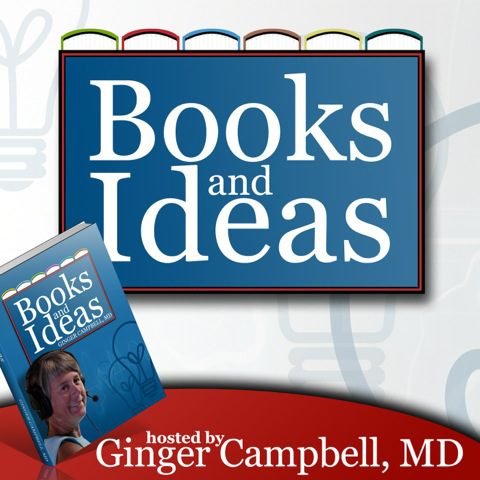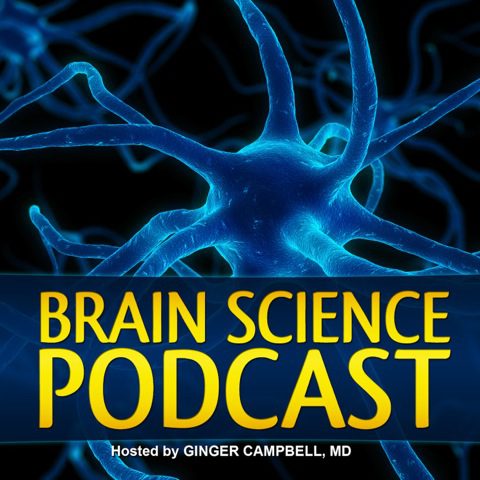Starting a podcast is a pretty simple. Staying committed, inspired and consistent in publishing your podcast is a whole other matter.
In our Podcasting Luminary Series, we share the voices of podcasters that have been podcasting for 5 or more years and have them impart some of their best podcasting wisdom grounded in experience.
Dr. Ginger Campbell is a pioneer in podcasting. She’s consistently put out top notch content that not only adds to the podcasting community as a whole, but feeds our collective brains, and we all need that!
She has been podcasting for almost 7 years producing two podcasts in tandem. Woah. The Brain Science Podcast and Books and Ideas.
She is proudly celebrating her 100th episode of the Brain Science Podcast and we are proud to celebrate along with her.
Take the time to inhale this great insight into what it takes to podcast, as well as how to sustain delivering top-notch content continuously!
Fun, Fame or Profit? Why are you doing the show?
While I enjoy podcasting, it really is a lot of work.
When I started I was motivated by the desire to be part of the podcasting community and by a desire to share ideas with others.
Then I discovered that I have a gift for science communication and I would like to turn this into a career, but science doesn’t really attract advertisers. I would love to be RICH but not TOO Famous, but neither one has happened yet!
What is your show about?
The Brain Science Podcast is “the show for everyone who has a brain.” We explore how recent findings in neuroscience are unraveling the mystery of how our brain makes us who we are.
The show is aimed at listeners of all backgrounds. It includes book discussions and interviews with leading scientists.
Books and Ideas was inspired by Mur Lafferty’s Geek Fu Action Grip.
It is basically where I put anything that doesn’t quite fit on the Brain Science Podcast, but it is mostly interviews with interesting people ranging from podcasting pioneers like Mur and Scott Sigler to the Nobel Prize winning physicist Frank Wilczek.
What is your most memorable feedback from a listener?
I am tempted to tell you about the people who write to tell me how the Brain Science Podcast has changed their lives, but the first thing that comes to my mind was the listener who wrote that he was listening while playing a video game, but he had to turn off the video game to concentrate on my show!
On the Value of Listener Feedback
You do need a thick skin, since not all listener feedback is constructive, but I think listener feedback is invaluable.
First of all it keeps you going when you want to quit, but it is also full of surprises.
I discovered that my listeners were much more diverse than I ever imagined, which is why I work so hard to vary the technical level of my content. That’s just one example, but if you pay attention to your listeners it can help you make a better show.
What has changed the most in your recording setup since you started and what is your podcast workflow?
Actually my set up has gotten simpler. I used to have a Mixer and a PreAmp, but I took the PreAmp out because I was actually making things sound worse.
Eventually my FireWire Mixer became obsolete so I simplified down to a simple M-Audio A/D Converter.
I think the Microphone is the most important piece of equipment I own.
I use Shure SM 58 microphone, with the XLR output plugged into an M-Audio Mobile Pre, which is basically an A/D converter, which plugs into my Mac via USB.
I generally record directly into my desktop Mac. If I am recording just my own voice I use GarageBand. If I am doing an interview, I record off Skype using a program called AudioHijack Pro.
I record myself on one track (L) and my guest on the other (R) so that I can clean up the sound afterwards.
 Because GarageBand doesn’t allow one to split the tracks I input my original audio (AIFF) into Audacity (free for Mac or PC).
Because GarageBand doesn’t allow one to split the tracks I input my original audio (AIFF) into Audacity (free for Mac or PC).
Because Audacity is somewhat prone to crashing (and because I am really comfortable with GarageBand), all I do in Audacity is split the original audio into 2 mono tracks.
Then I import the 2 mono tracks into GarageBand for clean up.
At this stage I mainly eliminate anything from my track that isn’t me speaking and do the same for my guest. After this I export a file from GarageBand to merge the two tracks. This basically creates a stereo track where the left and right are the same.
Finally I import this back into GarageBand for the main editing.
Depending on what the levels are like, I sometimes use a free program called The Levelator before this final import. The Levelator is great for bringing tracks with divergent sound levels together at a uniform level.
I spend an average of one hour editing for every 10 minutes of content.
I do this because I my goal is to create evergreen content that is as close to audio book quality as I can produce.
I think this is important because I am competing in a space that includes NPR and several major science publications.
Once the show is ready I upload it to DropBox so my transcriber Lori Wolfson can have the transcript ready before I release the show through Libsyn.
Finally I upload the mp3 via the Libsyn web interface AND prepare extensive show notes for my website.
I also have a newsletter but fortunately since I started using MailChimp I can generate this automatically with my blog post (show notes).
What is the hardest thing about podcasting?
Libsyn makes it really easy to get your content out into the world, but the reality is that podcasting consumes a lot of time and energy.
Since I do science and talk to scientists, my shows require many hours of prep both before and after I record.
Other types of shows might be less extreme, but if you want to put out great content, you need to be willing to put in this time.
Podcasting is likely having a second–extremely low paying–job!
Do download numbers matter matter to you? or is audience engagement key?
I do pay attention to downloads but I learn a lot more about my audience from their feedback via email, etc.
Audience feedback is what convinced me to keep going when I thought about quitting!
What advise would you give a new podcaster so that they keep going!
If I had it to do over the one thing I would do different is have a co-host because sometimes all this work gets a little lonely!
What piece of advice would give others looking to generate revenue from podcasting whether directly or indirectly?
Don’t podcast to make money. Do it because you enjoy it—unless of course someone else is offering to pay you!
If you charge for access to your podcasts or premium, how did your audience react when you started doing this? How did you handle this?
I considered making my show premium but decided that it was not right for me.
My show is educational and many of my listeners would not be able to afford a premium version. I think it is highly unlikely I could generate enough paying listeners to make it worth what it would cost me in terms of listeners, not to mention the complications in trying to get guests, etc.
[youtube]http://www.youtube.com/watch?v=HWlElknVMmk[/youtube]
On the Rewards of Podcasting
I started podcasting because I was attracted to the community, and although I have less contact with other podcasters than I would like, I would still say that PEOPLE are what make it worthwhile.
Hearing from listeners from around the world, and finding out how the Brain Science Podcast has touched their lives, keeps me going when I want to quit.
Also, I have gotten to interview so many interesting, bright people. They share their passion with my listeners and give people a sense of what scientists really do.
One of the most amazing things to me has been the realization that through podcasting I have touched more people’s lives than I do as a physician, which can also be a little sobering! (Note: I still make my living as an emergency physician in rural Alabama.)
After that interview you know you wanna go subscribe to The Brain Science Podcast and/or Books and Ideas! You can also connect with Dr. Campbell on twitter, but the best place is to go check out her work on her online hub.
Also, Dr. Campbell has a supersonic eBook called Are You Sure? The Unconscious Origins of Certainty. It is available from Amazon and on PDF is on her website.
[box]We would LOVE to support you in starting your own podcast. Start by getting yourself and account here![/box]


